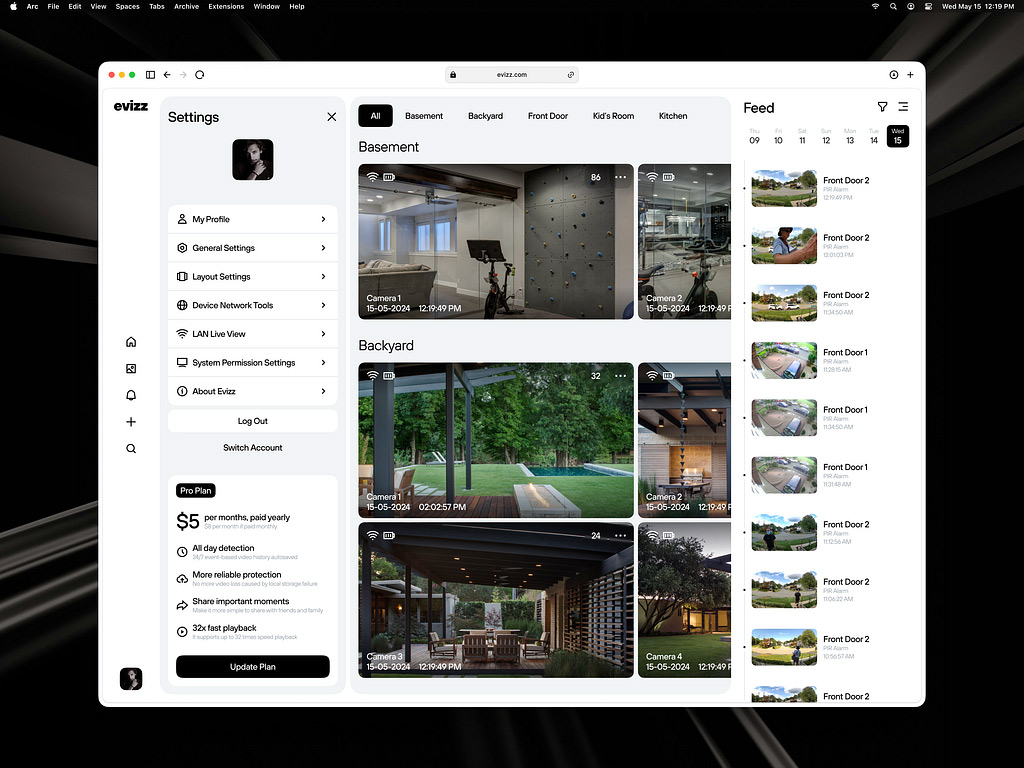In real estate, where every decision can make or break a deal, the pressure to stay ahead of the curve is daunting. The data amount for analysis is enormous, the legal requirements are strict, and users are picky – in these conditions, a simple real estate app is no contender on the market.
Contents:
However, with cutting-edge technology like AI, you have a chance to strengthen your realtor services and win a place under the sun. Tedious task automation, personalized property recommendations, quick data analysis, and engaging content bring your project to a whole new level.
We’ll explore the transformative power of AI in real estate, revealing industry insights, possible applications, and upcoming trends. Let’s dive into the challenges you face and discover how harnessing Artificial Intelligence can alleviate your users’ pains and propel your startup into a new realm of success.
Understanding AI for Realtors
Artificial Intelligence or AI is the simulation of human intelligence in machines programmed to think and learn like humans. It can understand natural language, recognize patterns, and make informed decisions just like any other person. This technology is shaping industries across the board, and real estate is no exception.
As a realtor, you face numerous challenges: from analyzing market trends to improving customer engagement. With AI, you streamline these processes, bringing efficiency and precision to various operations. You can gain insights that lead to better decision-making and enhanced client experiences.
According to a report by Deloitte, approximately 46% of real estate firms use AI and machine learning technologies to their advantage. At the same time, MarketsandMarkets forecasts that AI in real estate will grow from $1.2 billion in 2020 to $3.6 billion by 2025, reflecting an annual growth rate of 24.3%.
So, Artificial intelligence integration into operations is not just a trend; it’s a necessity if you’re looking to thrive in an increasingly competitive landscape. You can elevate your offerings, optimize workflows, and deliver unmatched value to clients.
A survey from McKinsey & Company revealed that companies leveraging AI can increase their profitability by 20-25%.
Using AI in Real Estate
There are different ways you can leverage smart algorithms in your application.
Enhanced Property Valuation
AI-enhanced property valuation leverages algorithms and machine learning to analyze extensive datasets, including historical sales data, property characteristics, neighborhood metrics, and market trends. This way, you generate real-time property valuations that are accurate and also adaptive to changing market dynamics.
This gives you a significant competitive edge, as you can process and analyze vast amounts of information far beyond the capacity of human analysts. It offers a comprehensive view of property values based on real-time data, minimizing subjective bias and delivering valuations genuinely reflective of current market conditions.
For example, you can harness AI to analyze how specific improvements (like renovations or energy efficiency upgrades) impact property values. AI can integrate geospatial data to assess location-specific factors that influence property valuation. This includes proximity to schools, public transportation, parks, and other amenities—allowing for a more nuanced understanding of how location impacts market value. It’s a massive help for investors and homeowners to make informed decisions about potential projects.
Several companies use machine learning in real estate:
- Zillow leverages AI in its “Zestimate,” providing estimated property values based on a multitude of factors and continuous data updates.
- Redfin employs smart algorithms to rapidly analyze property listings and market trends, improving their valuation estimates and enhancing the home-buying experience for clients.

Real Estate Dashboard Design Concept by Conceptzilla
Predictive Analytics for Market Trends
It uses statistical algorithms and machine learning techniques to analyze current and historical data, allowing professionals to forecast future market trends and behaviors. In real estate, advanced analytical models identify patterns, assess risk, and anticipate changes in property values and market dynamics.
This data-driven forecasting helps you identify hot spots and emerging opportunities before they become mainstream. For instance, you can locate which neighborhoods or property types are likely to appreciate over time.
At the same time, AI in real estate allows you to assess risk comprehensively. You see potential market downturns, fluctuations in demand, and economic shifts beforehand, and as a result, you can develop contingency plans to mitigate risks associated with market changes
Here are several potential competitors that are harnessing AI-driven predictive analytics to shape their real estate strategies:
- CoreLogic utilizes predictive modeling to deliver insights on property values and market dynamics, guiding investors and lenders through complex assessments.
- HouseCanary employs machine learning algorithms to create predictive models that forecast property appreciation rates and provide insights into market trends across different regions.
Chatbots and Virtual Assistants
These virtual helpers simulate real-life conversations with users through text or voice, providing immediate responses to inquiries. They handle a variety of tasks, ranging from answering FAQs to guiding people through complex processes to solve their issues. In real estate, these AI-driven tools facilitate communications between agents and clients, making interactions more efficient and impactful.
One of the standout features is their ability to operate around the clock. Regardless of time zones or business hours, these tools can answer client queries, schedule showings, and provide property information. Potential buyers or renters can get assistance whenever needed.
Additionally, by leveraging data analytics, chatbots can tailor conversations to individual users based on their preferences and previous interactions. This personalization creates a more engaging client experience, increasing conversion and fostering a sense of connection with the agency.
If you’re on a tight budget, implementing chatbots and virtual assistants can significantly reduce your operational costs. Using AI in real estate for routine automation, you can allocate resources more efficiently and reduce the need for extensive customer service teams. Also, Artificial Intelligence makes their work easier too, since they don’t have to spread their efforts and can concentrate on pressing issues.
Numerous real estate firms and platforms are leveraging virtual assistants to enhance their operations:
- Zillow has integrated a chatbot to assist users in finding homes and facilitating inquiries with agents, enhancing user engagement and improving lead capture.
- Rex Real Estate employs AI-driven chatbots on its website to provide immediate support to buyers and sellers, answering questions about listings and guiding users through the buying or selling process.
- Compass uses AI for realtors to manage their tasks, automate routine inquiries, and maintain client communication, allowing them to focus more on closing deals.

Security Control Panel Design Concept by Conceptzilla
Smart Property Management Solution
Such solutions combine Artificial Intelligence with traditional property management practices. They utilize machine learning, predictive analytics, automation, and IoT (Internet of Things) devices to manage various aspects of property management, including tenant relations, maintenance requests, financial tracking, and lease management.
Imagine all the time spent on application approvals, document creation, and lease renewals – now you can dedicate those hours to business issues at hand.
With automated financial systems, you can track rent collections, monitor expenses, and generate financial reports with minimal manual input. Moreover, predictive analytics show statistics on cash flow and budgeting, helping you and realtors make informed financial decisions.
AI in real estate can enhance the tenant screening process by using algorithms to evaluate applications based on multiple criteria, minimizing bias and increasing efficiency. Additionally, AI-driven platforms help managers maintain detailed records of tenant interactions and history, allowing for better tenant management.
Here are some rivals leveraging Artificial Intelligence to enhance operations:
- AppFolio offers a smart property management solution that streamlines accounting, marketing, and tenant communication, so property managers handle their portfolios more efficiently.
- Buildium integrates AI tools for tenant screening, payment processing, and data analytics, helping property managers make informed decisions.
- Zillow Rentals utilizes machine learning to refine its recommendation algorithms, allowing landlords to connect with prospective tenants more effectively.
Smart Home Technology
It is a system of interconnected devices and appliances that you can remotely control and monitor through a smartphone or a centralized hub. They communicate with each other, collect data, and perform automated tasks, greatly enhancing convenience, security, and energy efficiency in residential properties.
The systems are especially helpful in security. Machine learning algorithms can analyze vast amounts of data including audio and video to learn the patterns of everyday life and detect anomalies. Smart cameras can recognize familiar faces, alert homeowners about suspicious activities, and even differentiate between different types of motion. Smart locks facilitate seamless check-ins for tenants, enabling remote access without the need for physical keys.
With smart home technologies, you can minimize energy consumption, leading to lower utility bills and a reduced carbon footprint. Smart thermostats, lighting systems, and appliances adapt to the habits of residents and use power only when necessary.
This way, you provide a higher level of security and peace of mind, making properties more attractive to potential buyers or renters.
Zillow is already harnessing AI for realtors. The company expanded its platform to highlight homes with smart technology features, appealing to tech-savvy buyers seeking modern living solutions.

Property Rental Booking Website by Conceptzilla
Virtual Tours and Augmented Reality
These immersive digital representations of property allow potential buyers or tenants to navigate through the space as if they were there in person.
In the case of virtual tours, you use 360-degree photography or video to walk through the property with a detailed view of the layout, design, and unique features of the housing.
Augmented Reality overlays digital information—like furniture, décor, or even virtual staging—onto the real world, seen through devices such as smartphone cameras or AR glasses. This technology superimposes digital elements onto physical spaces, so during the visit, users can visualize how a property might look with their personal touch.
Virtual tours allow buyers to experience properties in a highly interactive manner. They eliminate geographical barriers, enabling potential buyers from anywhere in the world to view listings without the need for physical travel. This is particularly advantageous in today’s global market, where remote work and flexibility are on the rise.
For both buyers and real estate agents, virtual tours save time. Potential buyers can narrow down their choices before committing to physical viewings, ensuring that they visit only the properties they really like. You, as a real estate specialist, save time and resources. This increases efficiency in the buying process and reduces costs associated with travel and scheduling.
Here are some companies that started using AI in real estate to create immersive experiences:
- Zillow 3D Home enables home sellers to create virtual walkthroughs of their properties, complemented by AI-driven recommendations for staging and design adjustments.
- Houzz offers AR capabilities that allow users to visualize how different products and decor would look in their own homes, integrating shopping and design.
Content Creation for Property Listings
Eye-catching and informative property listings are essential for attracting potential buyers and renters. Traditionally, creating compelling content for listings required significant time and effort since you created it all manually. However, the advent of Artificial Intelligence has lifted this weight off your shoulders, and now you can generate high-quality property listings quickly and efficiently.
The best AI for real estate analyzes key property features—such as size, location, amenities, and design—and automatically generates well-structured, engaging descriptions. Thanks to audience segmentation, the texts are personalized to cater to specific buyer personas, making your content more engaging. What’s more, the algorithms can perform SEO optimization to enhance visibility and improve the chances of the property being found online. For example, identify relevant keywords and phrases that potential buyers are likely to search for.
Apart from generating texts, you can create high-quality images, videos, and virtual tours for your listings. For instance, instead of making videos from pictures manually, you can ask AI for help, and it will generate a clip with effects and subtitles.
Realtor.com and Zillow use smart tools to generate compelling property descriptions and optimize them for search engines, enhancing their online visibility.

Travel Booking Concept by Shakuro
Future Trends of AI in Real Estate
As the technology continues to mature, several key trends are emerging that promise to reshape real estate, from property management to sales and marketing.
How will AI affect real estate in the next years? Let’s take a look at the most promising trends:
AR-Powered Virtual Tours
This trend is reshaping how properties are marketed and experienced by potential buyers. AR allows potential buyers to visualize properties in a more immersive way. Users can interact with 3D models of homes, walk through rooms, and examine details in a realistic context.
Advantages:
- Wider Reach: Virtual tours attract remote buyers who may not be able to visit the property in person.
- Enhanced Visualization: AR tools help buyers envision modifications like furniture placement or renovations, leading to more informed decisions.
- Time-Saving: Reduces the number of in-person showings required, expediting the sales process.
Smart Contracts on Blockchain
While not exclusively AI, integrating smart contracts with AI can facilitate automated transactions, ensuring transparency and security in real estate deals.
Advantages:
- Increased Trust: Smart contracts create a tamper-proof record of transactions, boosting confidence among buyers and sellers.
- Reduced Transaction Time: Automating contract execution minimizes delays associated with conventional processes.
- Cost Efficiency: Reducing the need for intermediaries lowers transaction costs.
Facial Recognition Technology
AI-driven facial recognition technology can enhance security and improve tenant screening processes in residential and commercial properties.
Advantages:
- Enhanced Security: Streamlined access control for buildings ensures that only authorized individuals are permitted entry.
- Streamlined Tenant Screening: Facial recognition can help verify identities during the application process.
- User Convenience: Simplifies entry for residents and guests, replacing traditional keys or access codes.
Hyper-Personalization
Machine learning in real estate can analyze user behavior and preferences to provide highly personalized property recommendations to potential buyers or renters.
Advantages:
- Tailored Experiences: Clients receive customized listings based on their preferences, improving their overall experience.
- Increased Conversion Rates: Hyper-personalization can lead to higher engagement levels and improved sales conversion by presenting options that resonate with individual needs.
- Efficient Search Process: Reduces the time buyers or renters spend searching for properties, making the process more efficient.
Conclusion
AI for realtors is not just a passing trend; it is a transformative force that is reshaping how real estate professionals operate and how clients engage with the market.
Key aspects of smart applications range from predictive analytics that empower investors to make informed decisions, to chatbots and virtual assistants that provide round-the-clock assistance, improving customer service and lead engagement. Furthermore, automation in property management streamlines routine tasks, allowing property managers to focus on enhancing tenant satisfaction. AI-powered virtual tours and augmented reality are revolutionizing property showcasing, offering buyers an immersive experience without the need for physical visits.
The future of real estate, driven by Artificial Intelligence, promises to be more innovative, customer-centric, and responsive to market demands, paving the way for a new era in property management and transaction processes.
Thinking about data analytics integration into your real estate app? Reach out to us and let’s work together on your next project.

